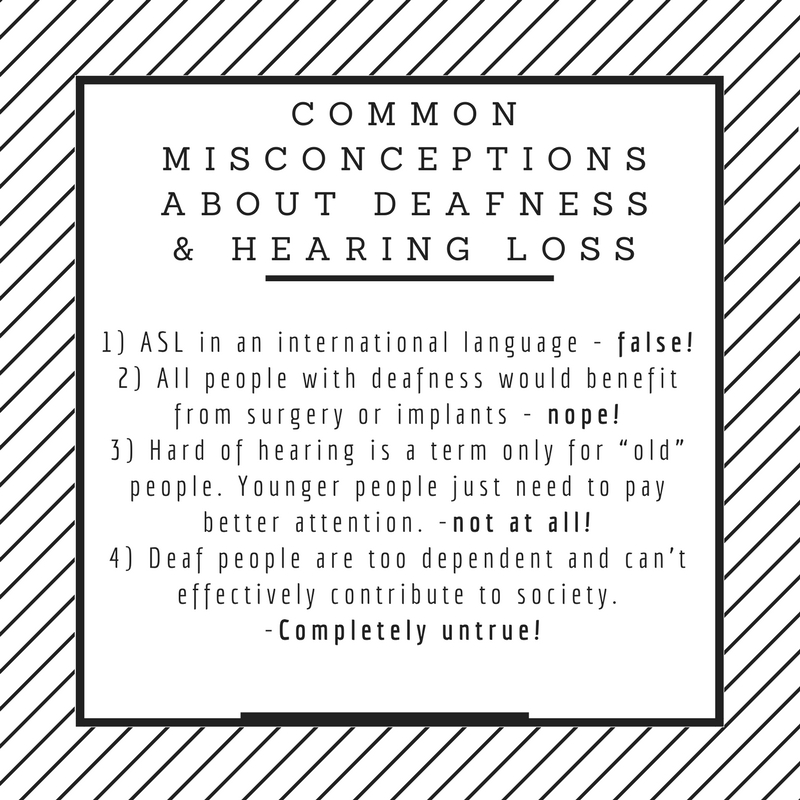
4 Misunderstandings about the Deaf and Hard of Hearing
About 130 million people on our planet are affected with hearing loss. About a third of them are children, and about half of all hearing loss is considered preventable. Because this can be considered a common condition, it is important to be aware that the deaf and hard of hearing often have their own unique set of challenges that we can all care about. Consider these few common misconceptions about the deaf and hard of hearing:
- ASL is an international language. No, it isn’t! In fact, ASL stands for American Sign Language. There is also a British Sign Language, French Sign Language, etc. I have personally put my foot in my mouth on this one. However, after learning about this, I found that it was easier to talk to those who are deaf or partially deaf because I knew at least something about their culture that was often misconceived. Also, knowing this has reminded me that I know very little about deaf culture and prompts me to ask more sincere questions whenever I get the chance.
- All deaf people would benefit from surgery, implants, and hearing aids. Wrong, again! In fact, surgery only works for about a quarter of those who are deaf as there are different types of deafness and different causes of deafness. Hearing aids are amplifiers, but they also don’t work for every person who is experiencing hearing loss. While it may be nice and heartwarming to watch those viral videos of babies and children who hear their mothers for the first time, stop yourself before you tell your deaf friend that they should try that, too. Most deaf people are a part of a unique culture and community that they feel close to, which is something that many of them don’t have any desire to let go of. Not to say that those who do opt into surgery (and if it works) are essentially opting out of that community, but it would be wise to refrain from telling them how much better their lives would be if they could hear, etc. Especially since many of us have no clue how fulfilling their lives can be without the ability to hear.
- Hard of hearing is a term only for “old” people. Younger people just need to pay better attention. Much like many other conditions in life, hearing loss affects all generations of people. That hearing loss can be debilitating at times, particularly if it hasn’t been diagnosed and treated (in cases where it would be beneficial to the patient). Losing the ability to hear might be a natural progression in life for many, but it doesn’t have to be a reason for us to treat our friends and family disrespectfully. I have personally witnessed people get overly flustered about their parents’ or siblings’ hearing loss when it could have been dealt with much more lovingly and appropriately.
- Deaf people are too dependent and can’t effectively contribute to society. Completely untrue! Many deaf people can drive, read, write, go to school, raise children, work, etc. In fact, their unique challenge of needing to constantly communicate with others who have a difficult time understanding them can make them better communicators (and listeners) than hearing people! Have you ever been told that less than 10% of communication is verbal? About a third of it is tone of voice and the other half is body language, which is something that many hearing people don’t even pick up on very well, and often something that the deaf and hard of hearing are very skilled at. Also, because they can read and write, they can effectively communicate in many work settings and school settings.
Hopefully some of this information can equip you to talk more openly and effectively to and about those who are deaf or hard of hearing. If you or a loved one is deaf or hard of hearing and is looking for a drug or alcohol recovery center, we’d love to discuss our options with you. Lifeline Connections is one of the few recovery centers in the nation that uses ASL. We offer anger management, domestic violence treatment, and relapse prevention. We believe that you can recover, and we can help you develop the right tools to get there. If you are looking for an assessment, please contact:
Mary Jacobs, CDP
Voice: 360-397-8246 ext. 7464
VP: 360-719-4430
Email: [email protected]
Fax: 360-397-8450
